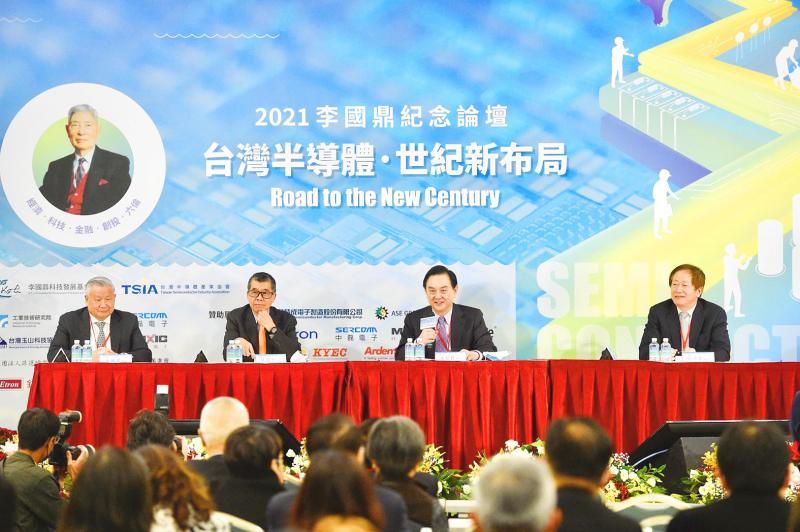Contract chipmaker Taiwan Semiconductor Manufacturing Co (TSMC, 台積電) and integrated circuit designer MediaTek Inc (聯發科) are optimistic about the “metaverse” concept, expecting it to create major opportunities for the semiconductor industry.
At a tech forum last week to commemorate former finance minister K.T. Lee (李國鼎), who has been dubbed the father of Taiwan’s economic miracle and who helped build Taiwan’s semiconductor sector in the second half of the 20th century, TSMC chairman Mark Liu (劉德音) said he expects the metaverse to grow quickly in the next decade.
Over the next 10 years, data computing power and transmission speeds are forecast to increase significantly, paving the way for a combined real and virtual world, Liu said.

Photo: George Tsorng, Taipei Times
TSMC has been developing the technologies needed for metaverse applications, he added.
The metaverse concept has been promoted by Facebook Inc chief executive officer Mark Zuckerberg since July. It refers to a digital world where people can move between devices and communicate in a virtual environment.
Liu said hardware for the metaverse concept has been in development for years, leading to the belief that augmented reality (AR) devices could replace smartphones and virtual reality (VR) gadgets could replace personal computers.
The main problem is how to make AR and VR headsets more affordable and lighter with a longer battery life, Liu said, adding that the headsets “have to be improved 100-fold” if they are to become as popular as smartphones.
MediaTek chairman Tsai Ming-kai (蔡明介) said the AR and VR device market is forecast to be worth US$500 billion by 2040, and the applications for devices to be used in the metaverse would be a main target of the semiconductor industry.
The market for these applications, which would be used while working, socializing, gaming, buying goods or making financial transactions, could grow to US$8.3 trillion, Tsai said.
The metaverse concept is expected to prompt more suppliers to develop VR and AR devices, Taipei-based market information advisory firm TrendForce Corp (集邦科技) said.
It forecast that shipments of VR and AR devices would hit 12.02 million units next year, up 26.4 percent from a year earlier.
TrendForce said the smart manufacturing market resulting from the metaverse concept is expected to top US$540 billion in 2025.
Other Taiwanese semiconductor suppliers such as Novatek Microelectronics Corp (聯詠科技), which supplies driver ICs for flat panels, and Phison Electronics Corp (群聯電子), a memory control IC maker, also appeared upbeat about metaverse applications.

SEEKING CLARITY: Washington should not adopt measures that create uncertainties for ‘existing semiconductor investments,’ TSMC said referring to its US$165 billion in the US Taiwan Semiconductor Manufacturing Co (TSMC, 台積電) told the US that any future tariffs on Taiwanese semiconductors could reduce demand for chips and derail its pledge to increase its investment in Arizona. “New import restrictions could jeopardize current US leadership in the competitive technology industry and create uncertainties for many committed semiconductor capital projects in the US, including TSMC Arizona’s significant investment plan in Phoenix,” the chipmaker wrote in a letter to the US Department of Commerce. TSMC issued the warning in response to a solicitation for comments by the department on a possible tariff on semiconductor imports by US President Donald Trump’s

The government has launched a three-pronged strategy to attract local and international talent, aiming to position Taiwan as a new global hub following Nvidia Corp’s announcement that it has chosen Taipei as the site of its Taiwan headquarters. Nvidia cofounder and CEO Jensen Huang (黃仁勳) on Monday last week announced during his keynote speech at the Computex trade show in Taipei that the Nvidia Constellation, the company’s planned Taiwan headquarters, would be located in the Beitou-Shilin Technology Park (北投士林科技園區) in Taipei. Huang’s decision to establish a base in Taiwan is “primarily due to Taiwan’s talent pool and its strength in the semiconductor

Industrial production expanded 22.31 percent annually last month to 107.51, as increases in demand for high-performance computing (HPC) and artificial intelligence (AI) applications drove demand for locally-made chips and components. The manufacturing production index climbed 23.68 percent year-on-year to 108.37, marking the 14th consecutive month of increase, the Ministry of Economic Affairs said. In the first four months of this year, industrial and manufacturing production indices expanded 14.31 percent and 15.22 percent year-on-year, ministry data showed. The growth momentum is to extend into this month, with the manufacturing production index expected to rise between 11 percent and 15.1 percent annually, Department of Statistics

An earnings report from semiconductor giant and artificial intelligence (AI) bellwether Nvidia Corp takes center stage for Wall Street this week, as stocks hit a speed bump of worries over US federal deficits driving up Treasury yields. US equities pulled back last week after a torrid rally, as investors turned their attention to tax and spending legislation poised to swell the US government’s US$36 trillion in debt. Long-dated US Treasury yields rose amid the fiscal worries, with the 30-year yield topping 5 percent and hitting its highest level since late 2023. Stocks were dealt another blow on Friday when US President Donald